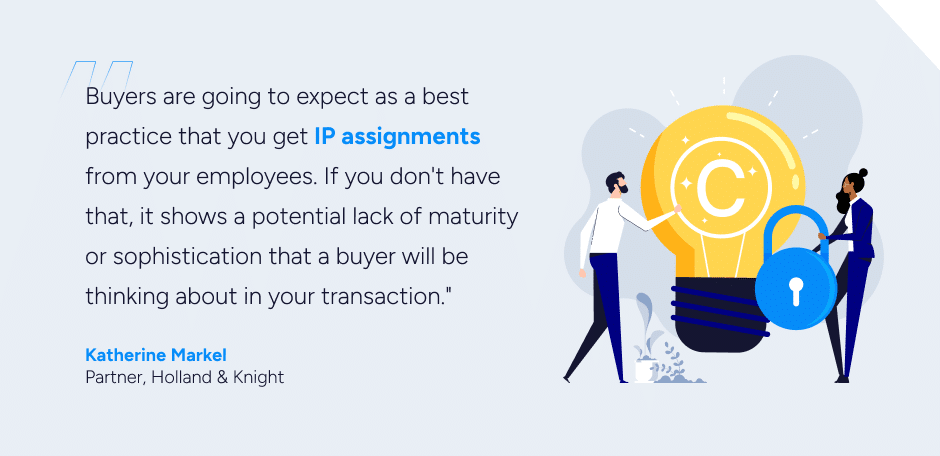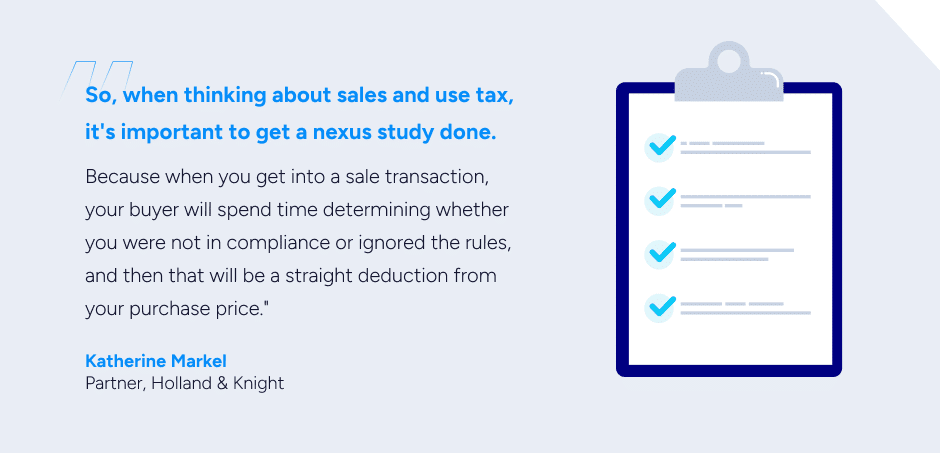Legal Considerations for Successful Exit Planning

For software company founders, exit planning is among the most intensive and stressful situations they may ever face. However, it can also be one of the most rewarding. Software executives may maintain their current role with their company post-sale or even take on additional responsibilities at the acquiring company or its board of directors. However, to maximize the chances of a profitable outcome, founders must proactively prepare for the sale.
This holds particularly true from a legal standpoint, where thorough preparation can streamline due diligence, address issues preemptively, and mitigate risks. For successful exit planning, founders must remain engaged in legal preparations rather than delegating them fully to an attorney or advisor to handle (or ignoring them altogether), as certain items should be addressed well before a sale to ensure an optimal outcome.
We recently hosted a webinar, Unlocking the Full Value of Your Exit—Legal Strategies for Software Leaders, featuring Diamond Innabi, Principal at SEG, and Katherine Markel, Partner at Holland & Knight LLP, a global law firm. Markel specializes in M&A legal issues for middle-market software companies and offers expert insights into the key legal considerations essential for companies entering the M&A arena.
Whether you’re actively pursuing a deal or strategizing for the future, this article aims to equip you with the knowledge and strategies necessary for an optimal outcome.
- Exit Planning Guidance: Getting Your Legal House in Order
- 1. Who Really Owns Your Company?
- 2. What is Your Company’s Tax Status?
- 3. Are Customer and Vendor Contracts in Order?
- 4. How Do You Manage IP Ownership?
- 5. Have You Conducted a Nexus Study?
- 6. How Are Employees Classified?
- Prepare Now for a Future Sale
Exit Planning Guidance: Getting Your Legal House in Order
The consequences of not getting your legal house in order ahead of a sale can be dire. Following many months of intense negotiation, if you are not prepared when the buyer or their advisor requests certain data or information, it can throw off the entire timeline. Worse, you or your buyer may uncover a deeper issue that can potentially scuttle the deal in the eleventh hour.
To avoid such scenarios, here are six critical areas to address before you begin exit planning:
1. Who Really Owns Your Company?
Missing or inadequate corporate governance documentation is a common risk for founder-led companies. Maintaining organized corporate records is an essential step toward ensuring a path to a smooth sale, particularly in two areas: corporate ownership and corporate compliance.
First, confirm your company’s capitalization table. In other words, can you access legal documentation showing who owns your company?

Markel says. “This is one of those very foundational questions that you might not think is important when you’re going to sell, but ultimately, your buyers are going to be buying the equity of your business, so they need to know who actually needs to sell that equity to them.”
Markel also emphasizes the importance of reviewing any special equity holder rights that have been granted over time through mechanisms like shareholder agreements, rights of first refusal, and drag-along and tag-along rights, as they can impact control and influence over any potential sale. For example, just because you own a majority of the equity does not mean that you can make the sale decision alone and it is important to know up-front who needs to be at the table.

Business owners should also focus on reviewing corporate compliance long before a sale. First, make sure that your company’s governing documents—including corporate resolutions, bylaws, and operating agreements—are in order and accessible. Then, create a system of records to house all board and shareholder meeting minutes and consents, along with records of good standing in your state of incorporation and any foreign qualifications. Buyers will want to see all of these records and it can take a long time to pull them together during a sale process (even more so if you have been in operations for a long time). When you are down to the wire, you want to be able to focus your time and effort on more important things than tracking down old records.
2. What is Your Company’s Tax Status?
Many software organizations choose to register with the IRS as S-corporations. Overall, this can be a positive measure for companies looking to sell eventually because potential buyers view that status favorably.

Along with this beneficial tax treatment comes very stringent rules regarding ownership structure. “If you’ve blown your election, they can’t necessarily get that step up in basis,” Markel adds. “It could impact your valuation, which is why we want to ensure you’re thinking about this from the beginning.”
Markel advises founders to spend some time upfront locating original tax status documents, if available, and setting up systems of record to provide easy access to these documents. Once more, organization is paramount in enabling your team of M&A experts to lead you to success effectively. From there, she recommends coordinating this review with professional accountants to ensure you avoid any foot-faults that could put your status at risk.
LEARN MORE: What is a QoE and Why Should I Pay for One?
3. Are Customer and Vendor Contracts in Order?
Another critical category of legal documentation is customer and vendor agreements. Such contracts can materialize your company’s valuation in the eyes of a potential buyer. For example, suppose certain customers have favored pricing or other special payment provisions. In that case, the value of their contract can vary greatly depending on the pricing you offer to other customers. Similarly, if your standard customer agreement includes a 30-day termination clause, that may reduce a buyer’s confidence that they could retain these customer relationships following a sale.
Concerns regarding vendor contracts include indemnification obligations, intellectual property rights, and rights triggered by a change of control or assignment. If you can develop a strong standard form agreement with your advisors and negotiation guidelines for your team, this will reduce the risk of unfavorable terms impacting your deal value.
Markel also recommends implementing a document management system to ensure easy access to all contracts. “You can build that into your CRM if you have one, or it can be as simple as a Google Drive with folders,” Markel says.

4. How Do You Manage IP Ownership?
A significant legal risk for software companies is maintaining IP ownership records and the steps companies have taken to protect the unique aspects of their software. Buyers will want to review your formally registered IP, such as patents, trademarks, and copyrights, as well as your internal records, such as IP assignments from employees and independent contractors. Your practices of using open-source and third-party IP are also a recurring challenge that often goes undocumented.
In her practice, Markel often sees significant material issues affecting IP ownership, including a lack of ownership documentation, a shortage of written licenses to use third-party IP, open-source licensing issues, and a need for proper disaster recovery procedures.

5. Have You Conducted a Nexus Study?
Sales and use tax can be a common issue in software transactions, where a 2018 case changed how states can determine nexus and greatly increased companies’ requirements to pay tax across a wide range of states.
This can be a complex analysis for SaaS and technology companies, and many software companies are not aware of the tax obligation or ignore the requirements. However, buyers consistently take a hard stance toward evaluating tax obligations during due diligence, making it imperative that sellers devote time upfront to this critical task.
“It’s about determining how many sales you make in that state that can bump you over their threshold and whether they tax SaaS, which is, unfortunately, a state-by-state analysis,” Markel says.

6. How Are Employees Classified?
Lastly, software companies must pay close attention to how they classify their employees, both in terms of exempt versus non-exempt status and employee versus independent contractor.

“If you have an employee who you classify as exempt and therefore not subject to overtime, the potential risk is that if you get audited or the employee brings a claim and you have to go to court, it could result in you being liable for the pay they would have otherwise been entitled to and overtime is time and a half. That can add up pretty quickly if you have a systemic problem.”
Many companies, especially on the smaller side, tend to classify all of their employees as exempt without regard to the classification requirements. Further, many rely on independent contractors who are misclassified employees. These types of issues will be raised by buyers in diligence. In addition to the potential liability that comes with misclassifications, correcting the issue can also make for employee relation issues that can create bumps in your transaction. Getting it done right up-front can help you avoid difficult conversations and ensure a smoother transition for your employees.
Prepare Now for a Future Sale
At this point, it should be abundantly clear that preparing ahead for a potential future exit can offer significant benefits. Having ready access to critical corporate documents and agreements enables you to present a positive first impression to your buyer. The above legal prep sets a positive tone for legal negotiation and reduces the workload for everyone involved, allowing you to get ahead of deal fatigue.
Start by preparing an organized and fulsome data room, and then identify those specific areas requiring further investigation, clean-up, and remediation. You should also evaluate your current tax structure to ensure you’re maximizing your firm’s value.
Putting in the effort up-front, while it may require some investment, will pay dividends down the road when you are looking to make an exit.
For more guidance on how to prepare now for a future sale, download our Complete Checklist for M&A Due Diligence.
Read More in this Series: Selling Your SaaS Company? How to Think Like Software Investors & Buyers.










